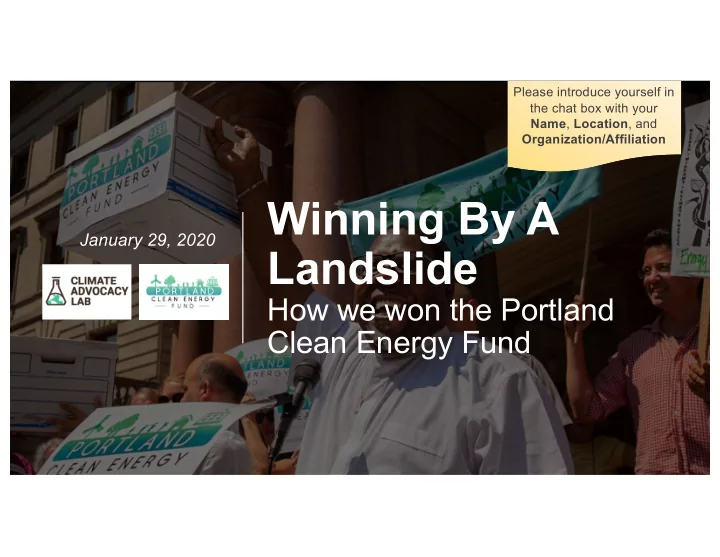

Please introduce yourself in the chat box with your Name , Location , and Organization/Affiliation Winning By A January 29, 2020 Landslide How we won the Portland Clean Energy Fund
Please introduce yourself in the chat box with your About the Climate Advocacy Lab Name , Location , and Organization/Affiliation Helping the climate community build grassroots power and win through evidence-based advocacy. Research & Workshops & Webinars Our (awesome!) members Online platform & alerts experimentation Contact: info@climateadvocacylab.org
Please introduce yourself in the chat box with your Name , Location , and Welcome to our speakers! Organization/Affiliation Khanh Pham Jenny Lee Adriana Voss-Andreae Brent Foster OPAL Environmental Asian Pacific American 350 PDX Attorney & Strategist Justice Oregon Network of Oregon
Please introduce yourself in the chat box with your Name , Location , and Organization/Affiliation Roadmap • Welcome & overview • PCEF Overview and Importance (Khanh) • Key challenges and… Winning! • Lessons Learned (Jenny) • Importance of the post-campaign phase • Key implementation highlights • The report! (Adriana) • Policy highlights and “DIY” (Brent) • Q&A • Close
A quick overview…
What is PCEF? The Portland Clean Energy Fund (PCEF) was established by a successful ballot measure passed by 65% of Portland voters in November 2018. It is the first-ever environmental measure in Oregon history created and led by communities of color. PCEF is funded by a 1% surcharge on retailers with over $1 billion in annual nationwide sales AND over $500,000 in annual Portland sales. PCEF will produce $54-$71 million in new annual revenue for green jobs and healthy homes with required investments in frontline communities (people of color and low-income Portlanders) With leadership from the Coalition that created and passed PCEF, the City of Portland is now implementing PCEF. Funds will be available in 2020.
How it works The City Revenue Division will collect the surcharge in a designated fund Nine-person committee of Portlanders reflecting the racial, ethnic, and economic diversity of the city will make recommendations to City Council on which proposals to fund $54-$71M Nonprofits, alone or in partnership with other nonprofits, businesses, or government entities, are eligible to apply.
What kinds of projects will it fund? 40-60%: Renewable Energy and Energy Efficiency projects for homes, schools, and businesses Examples include: rooftop solar, insulation upgrades, and more efficient HVAC systems ● 50% of these projects must benefit low-income residents and people of color ● Funding agreements must include provisions barring owners from using improvements ● funded by PCEF as a basis for rent increases. Steady funding stream for Portland & Multnomah County’s community energy goals ●
What kinds of projects will it fund? 20-25%: Job Training, Apprenticeships, and Contractor Support Will develop a diverse and well-trained workforce & contractor pool in clean energy ● Grant Committee will adopt a workforce and contractor equity plan to hire historically ● disadvantaged groups: women, people of color, people with disabilities, and more Programs supporting entry into union registered apprentice trades shall be a high priority ●
What kinds of projects will it fund? 10-15%: Regenerative Agriculture and Green Infrastructure Examples include tree canopy, community gardens, and swales. ● Sequester greenhouse gases and promote sustainable practices in communities of color ● 5%: Future Innovation Projects deemed by the grant committee to advance the goals of the PCEF but that do not ● explicitly fall into one of the other four categories.
Challenges and Strengths of the Campaign Lack of funding ● Lack of ballot measure/electoral experience ● Both these challenges led us to form a unique coalition structure and ● process which challenge traditional notions of how campaigns ‘must’ be run to succeed
Organizations of color met for years to create the measure language before filing an initiative petition Members of frontline communities--those How we did it on the “front lines” of the climate crisis-- held the primary leadership, strategy, and public speaking roles Predominantly white environmental organizations provided capacity in planning for and running the petition drive and campaign The coalition became a “new political majority” with hundreds of groups and individuals from every sector of the city.
Election Night, November 6, 2018 PCEF passes by over 65%, nearly 2-to-1 ● One of the few winning November 2018 ● climate ballot measures nationwide Nearly every precinct in Portland said ● yes Huge voter turnout in our turf ●
“An idea whose time has come” (The Nation) A “glimmer of climate optimism” (Fast Company)
Questions! Report https://bit.ly/2tch5iY Feedback https://forms.gle/D99LsuHoUMybopxx9 Contact info@climateadvocacylab.org https://portlandcleanenergyfund.org / Photo by Rick Rappaport
Thank you! Report https://bit.ly/2tch5iY Feedback https://forms.gle/D99LsuHoUMybopxx9 Contact info@climateadvocacylab.org https://portlandcleanenergyfund.org/ Photo by Damon Motz-Storey
Recommend
More recommend